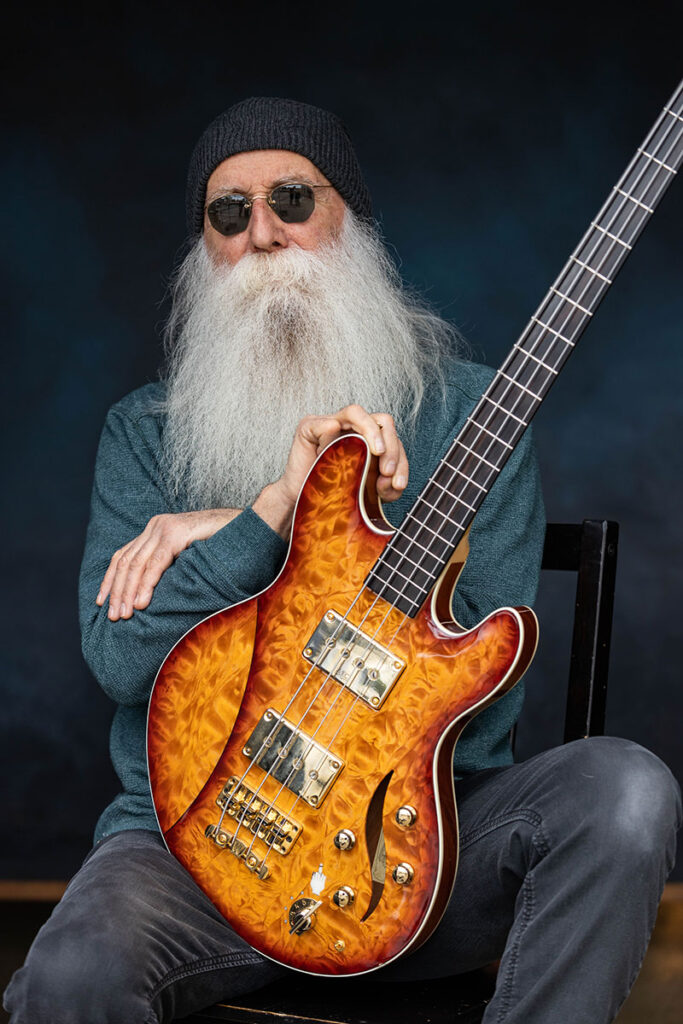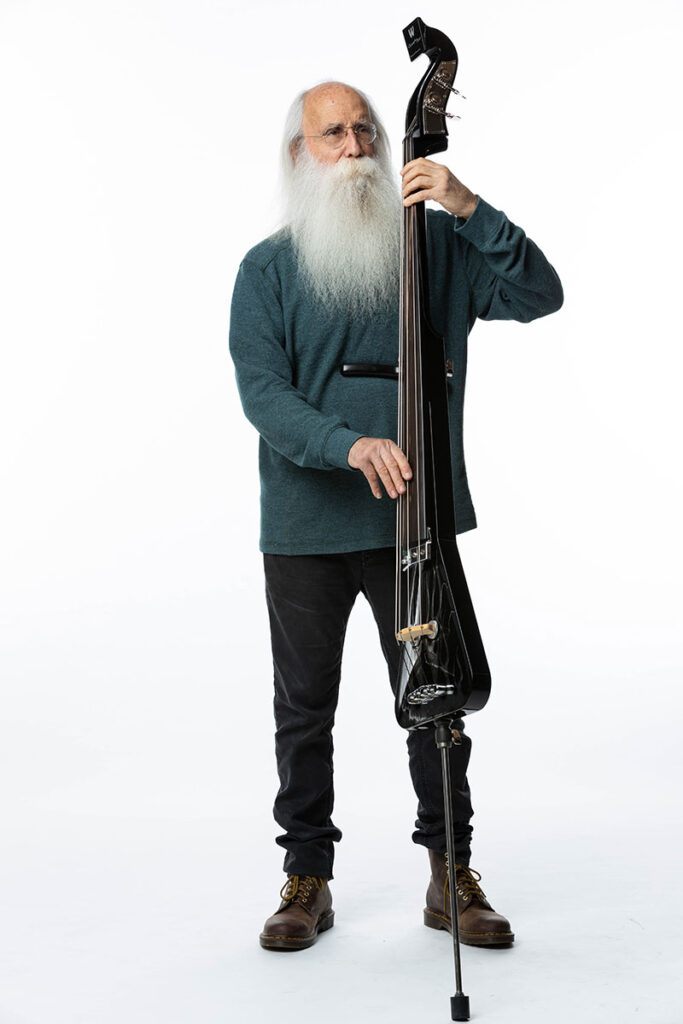
Before Paul McCartney was about to take the stage in Grand Rapids, Michigan, in August 2016, the 73-year-old former Beatle discussed with 69-year-old Lee Sklar and others in the dressing room the possibility of retirement.
“What else am I going to do?” Sklar says he was told by McCartney. “It’s all I’ve ever done, and I love every day of this. Why would I even think about giving it up?”
That’s the attitude and belief of bassist Sklar, whose name might be listed on more albums than any other musician’s name in a large rock, folk and pop record collection dating back to 1970. Sklar, who now is a member of the band the Immediate Family, has, for many decades, been a session and touring musician in great demand. His career took off as a member of James Taylor’s band in 1970 and Jackson Browne’s band two years later. He has played live and/or on albums with Carole King, Linda Ronstadt, Warren Zevon, Phil Collins, Willie Nelson, Hall & Oates and many, many, many others.
“I want to be playing music and doing what I do until I physically either can’t do it anymore or nobody’s calling me anymore,” says Sklar, whose current group released a new album, Skin in the Game, in February and is the subject of director Danny Tedesco’s Immediate Family documentary. “And then I would just look for a club to play in with some friends. It doesn’t have to be earning a living. It just has to be, because the living is the playing.”
The Immediate Family also includes other legendary session musicians Sklar has played with since the 1970s: Danny “Kootch” Kortchmar (guitar and vocals), Waddy Wachtel (guitar and vocals) and Russ Kunkel (drums). They were known as the Section decades ago and added session guitarist, vocalist and songwriter Steve Postell to the Immediate Family.
Jackson Browne let the group record Skin in the Game in his Groove Masters studio.
“The process is very quick for us,” says Sklar, who has his own YouTube channel. “We’ve been collectively and individually working together so long that, when we get into the studio, we’re not sitting there doing 20 takes of a song. We pretty much get tracks cut within one or two takes, so the process has been very organic.”
I ask Sklar what recording sessions with other artists stand out in his memory because they were especially fun and enjoyable.
“That’s a tough one,” he responds. “There’s been such a variety of projects — certainly the early days with James Taylor and Jackson Browne. We were all neophytes at that point. Our studio experience was almost negligible, and, all of a sudden, we were at the forefront of studio work. In the studio with someone like James or Jackson, first off, the guy sits down and plays you a song and you go, ‘Holy crap, this person is good.’ The songs are so unbelievable.”

Recording with Taylor “was always, for me, a difficult seat, because James has the most comprehensive guitar playing style,” Sklar adds. “He’s not just flat-picking or strumming his guitar. He has really orchestrated parts in his playing and a thumb that’s constantly playing bass. So, I had to think ‘what am I going to do on these songs,’ because he already had the bass part covered. Am I going to double it? Am I going to come up with a counter part that plays around what he is doing and against it? It really required me to rethink my style of playing, because I had come out of just hard rock when I met James.”
Browne’s songs were also a creative challenge.
“As a writer, he really gave you stuff to think about,” Sklar recalls. “Then there was a whole period of working with Linda Ronstadt, Carole King, Crosby, Stills & Nash and other people. It was such a fertile period of writers, and they really allowed myself, Russ, Kootch, Waddy, Craig Doerge and all the guys involved in their projects a pretty wide berth for coming up with parts. So, the juices that were flowing in the studio were really amazing and intense. I look back at those sessions and those songs with so much pleasure every day.”
Sklar also has pleasurable memories of working in another musical genre with the great drummer Billy Cobham. Cobham, a jazz and jazz-rock innovator who is still touring today, formed the Mahavishnu Orchestra with John McLaughlin after they played with Miles Davis. Sklar played bass on Cobham’s 1973 debut album Spectrum, which critics have hailed as his best album.
“I got to know Billy because the Section, our original band, was opening for Mahavishnu Orchestra on tour,” Sklar recalls. “I became friends with all those guys. When Billy got offered an opportunity to do his first solo album, we had hit it off, so he called me, and I went to New York to work with him and Jan Hammer. And the treat was when I walked into the studio: The guitar player was Tommy Bolin. I still consider Tommy one of the greatest guitar players ever to strap on that instrument.”
Sklar had met Bolin years before when he played in a band called Wolfgang, and Bolin was in Zephyr, a legendary Boulder, Colorado, band. The bands had the same management company and were booked together at live shows. But Sklar years later had no idea until he entered the studio that Bolin was involved in Cobham’s Spectrum project

“We cut that whole album in two days, and the energy in the studio was palpable,” Sklar recalls. “Every solo and everything that’s on that record is live. There are no overdubs. On one song, Tommy and Jan Hammer were trading licks — solo sections back and forth — and Tommy broke his E string right in the middle of his solo. You can hear it on the record, because they never went back and fixed it. He just kept playing. He was a remarkable, remarkable musician.”
Sklar was part of so many different recording projects in various musical genres. He played country music with Reba McEntire and Vince Gill, contemporary Christian music with Steven Curtis Chapman and classic religious songs with one of television’s most famous actors.
Straight out of Mayberry, Andy Griffith entered the studio with Sklar and other musicians to record Just as I Am: 30 Favorite Old Time Hymns in 1998. Griffith, of course, was most known for his 1960s comedy show, The Andy Griffith Show, and his role as a lawyer in Matlock in the 1980s.
“You’re sitting there two feet from Andy Griffith and just kind of freaking out, because, on the one hand, you’ve been hired to work together, and on the other hand, you’re uber fanboy, and you’re kind of just freaking out,” Sklar says. “Every once in a while, you find yourself in those situations that you walk away from and go, ‘This is really amazing.’ It evolved into a friendship. We would call each other and just see what was happening and stuff. And then, when we did a second album together, it was like family.”
Sklar, who has reportedly played on more than 2,000 albums, recalls another favorite project.
“When I went to London to do No Jacket Required with Phil Collins in 1984, it still stands the test of time to me,” he says. “Sitting in the studio with Phil, it was our first experience together other than meeting and doing a Lee Ritenour track in like ‘81. Phil’s energy and concept of pop music — and everything — were so great. I met Daryl Stuermer (solo artist and guitarist with Collins and Genesis) for the first time. Sting came in and sang, and I worked with (renowned British producer) Hugh Padgham.”
I ask Sklar to identify the best album he has ever heard that he doesn’t play on.

“One of my favorite albums is Steve Winwood’s Back in the High Life,” he responds. “It was one of the best records combining new technology and old-school playing. They did a lot of synth stuff, and it was done so well. I’ve always been a fan of Winwood since the Spencer Davis days. I would’ve loved to have recorded or done a tour or anything with him, but that never came up. Russ Kunkel played with him, but I haven’t had that chance. When I hear that record, it feels as fresh today as it did the first time I heard it.”
When Sklar listens to old records, two favorites are the Righteous Brothers’ 1963 debut album Right Now! and Vanilla Fudge’s self-titled 1967 debut album.
“That Righteous Brothers album was one of the albums I played over and over,” he says. “I played bass to it as I was learning bass. I’m also a huge fan of Major Lance. God, the wealth of music that has been created by humanity is just astounding.”
Sklar has been enriched personally and professionally by so many talented artists he has met and played with.
“I pinch myself every day at this gig — the people I’ve gotten to meet and work with,” he says. “I played last night in Carmel with Lyle Lovett, and, when I came backstage, there was Clint Eastwood hanging out. I looked at him and said, ‘God, last time I saw you, you were at the Conga Room in L.A. at our Billy Cobham Spectrum 30th anniversary show.’ He signed my Frankenstein bass, which is covered with autographs. and he had already signed it. Here we are again, almost 20 years later.”
The warm memories pop up daily.
“I sit every day and just go, ‘This is really mind-blowing sometimes’ — the things that go on, and a lot of stuff that happens around the playing,” Sklar says. “The playing is the conduit that gets everything going. But there are so many other aspects to all this — the people you meet and the places you get to see that really come in and make this that much more amazing.”
